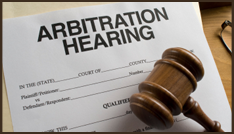 The Supreme Court of New Jersey recently refused to enforce a lawyer-client arbitration provision because it failed to include sufficiently detailed warnings to the client. See Atalese v. U.S. Legal Services Group, L.P., No. A-64 Sept. Term 2012 (Sep. 23, 2014). Said the court:
The Supreme Court of New Jersey recently refused to enforce a lawyer-client arbitration provision because it failed to include sufficiently detailed warnings to the client. See Atalese v. U.S. Legal Services Group, L.P., No. A-64 Sept. Term 2012 (Sep. 23, 2014). Said the court:
The absence of any language in the arbitration provision that plaintiff was waiving her statutory right to seek relief in a court of law renders the provision unenforceable. An arbitration provision—like any comparable contractual provision that provides for the surrendering of a constitutional or statutory right—must be sufficiently clear to a reasonable consumer.
Id. Because the wording of the lawyer-agreement did not “clearly and unambiguously signal to plaintiff that she was surrendering her right to pursue her statutory claims in court,” the New Jersey court held the arbitration agreement to be “unenforceable.”
The Louisiana Supreme Court has given Louisiana lawyers clear guidance as to how to draft an enforceable arbitration agreement. In Hodges v. Reasonover, 103 So. 3d 1069 (La. 2012), the court noted that a lawyer-client arbitration clause “does not inherently limit or alter either party’s substantive rights; it simply provides for an alternative venue for the resolution of disputes,” and held that a “binding arbitration clause between an attorney and client does not violate Rule of Professional Conduct 1.8(h) provided the clause does not limit the attorney’s substantive liability, provides for a neutral decision maker, and is otherwise fair and reasonable to the client.” Hodges, 103 So. 3d at 1076. However, the court set forth a number of terms required for the enforcement of arbitration clauses. At a minimum, an arbitration clause must inform the client:
- That the client waives the right to a jury trial;
- That the client waives the right to an appeal;
- That the client waives the right to broad discovery under the Louisiana Code of Civil Procedure and/or Federal Rules of Civil Procedure;
- That arbitration may involve substantial upfront costs compared to litigation;
- The nature of claims covered by the arbitration clause, such as fee disputes or malpractice claims;
- That the arbitration clause does not impinge upon the client’s right to make a disciplinary complaint to the appropriate authorities;
- That the client has the opportunity to speak with independent counsel before signing the contract.
See id. at 1077.
To download model engagement agreements that include Louisiana-compliant arbitration clauses, click here: Model Lawyer-Client Agreements.
